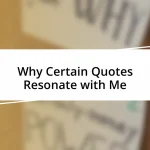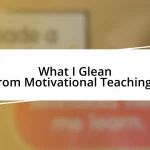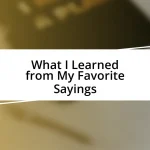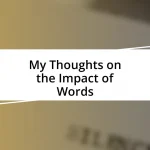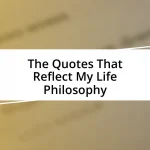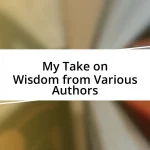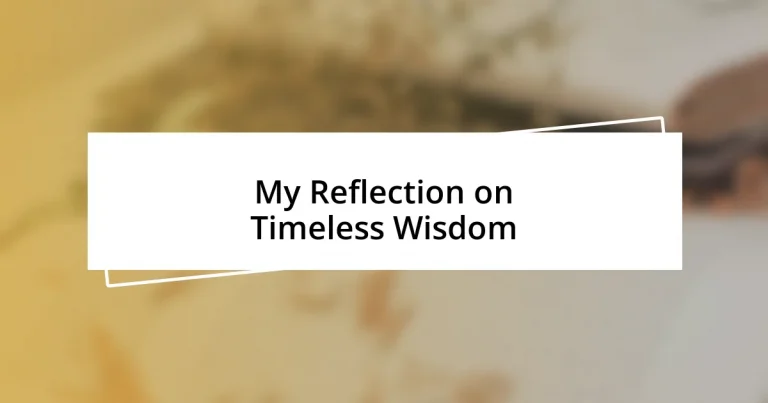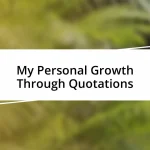Key takeaways:
- Timeless wisdom emphasizes the importance of patience, self-reflection, and considering the longer path in decision-making.
- Engaging in reflection enhances emotional well-being, clarity in decision-making, and self-awareness, ultimately leading to personal growth.
- Lessons from ancient philosophers highlight the value of critical thinking, balance, and self-knowledge in navigating life’s challenges.
- Sharing wisdom through storytelling fosters connection and can inspire hope and change in others, creating a supportive community.
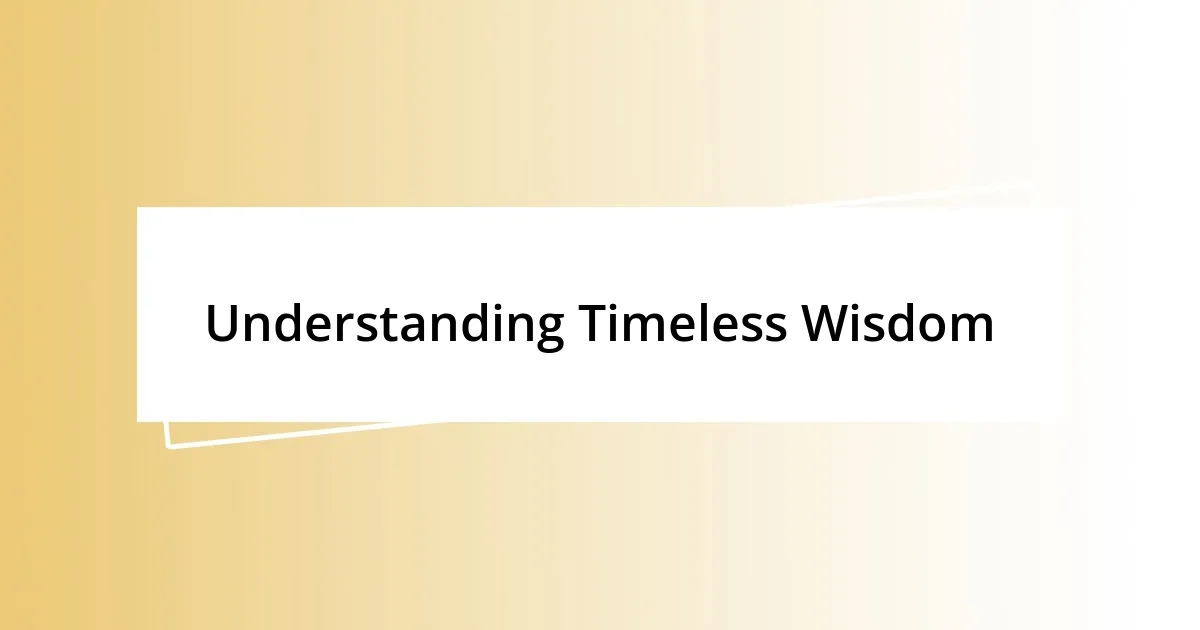
Understanding Timeless Wisdom
Understanding timeless wisdom often feels like connecting with an old friend. I remember sitting with my grandmother, who used to say, “Patience is a virtue.” At the time, I didn’t grasp its depth, but now I see it as a powerful principle that shapes decision-making and resilience in life.
Like many, I’ve experienced moments where immediate gratification seemed tempting. Reflecting on those times makes me appreciate how patience leads to more thoughtful choices. Have you ever rushed into something only to wish you had taken a step back first? That’s the essence of timeless wisdom; it teaches us to slow down and consider the longer path.
Moreover, timeless wisdom transcends cultures and generations. I often ponder quotes from various figures, like Confucius, who emphasized self-reflection. When I take a moment to think deeply about my actions and experiences, I find clarity. It strikes me that this fundamental practice is how we can truly understand ourselves and our journey in life—don’t you agree?
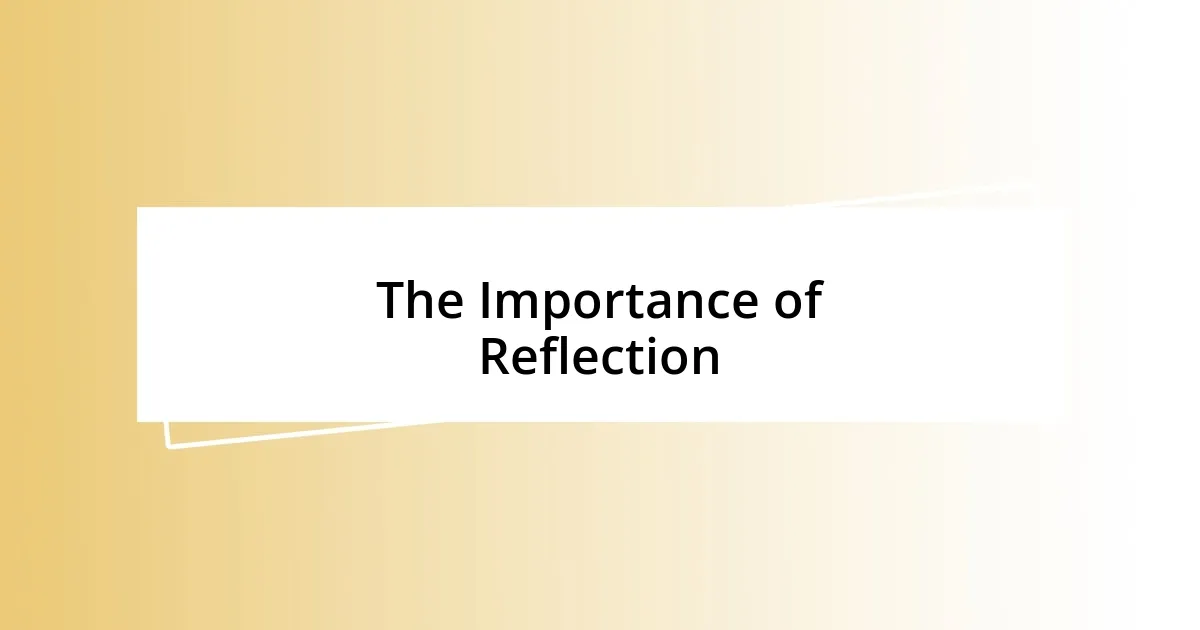
The Importance of Reflection
Reflecting on our experiences can unlock powerful lessons. I once took a spontaneous trip to the mountains, feeling excited by the escape. But as I strolled through the serene trails, I found myself contemplating my life choices. It was in that quiet space, away from the hustle and bustle, that I began to understand the decisions that had shaped my path. Can you recall a time when a moment of quiet reflection offered you clarity?
The act of reflection doesn’t just help us analyze the past; it also informs our future behaviors. I’ve noticed how regularly setting aside time to reflect fosters growth. For instance, I used to overlook my reactions in conversations, often jumping in without listening. However, reflecting on those interactions revealed patterns I wanted to change. Now, I strive to pause and listen, which deepens my relationships. Have you ever experienced a shift in mindset after taking time to think things through?
Engaging in reflection can also enhance our emotional well-being. I vividly remember a period of stress when I felt overwhelmed by daily demands. By pushing myself to reflect on my feelings, I realized the importance of setting boundaries. This practice not only alleviated my stress but empowered me to take charge of my life. Such moments remind us that self-awareness is key to finding balance. What insights have you gained from taking time to reflect?
| Benefits of Reflection | Examples |
|---|---|
| Clarity in Decision-Making | Contemplating past experiences to avoid repeating mistakes |
| Emotional Growth | Recognizing patterns in behavior to improve relationships |
| Enhanced Self-Awareness | Understanding personal limits to reduce stress |
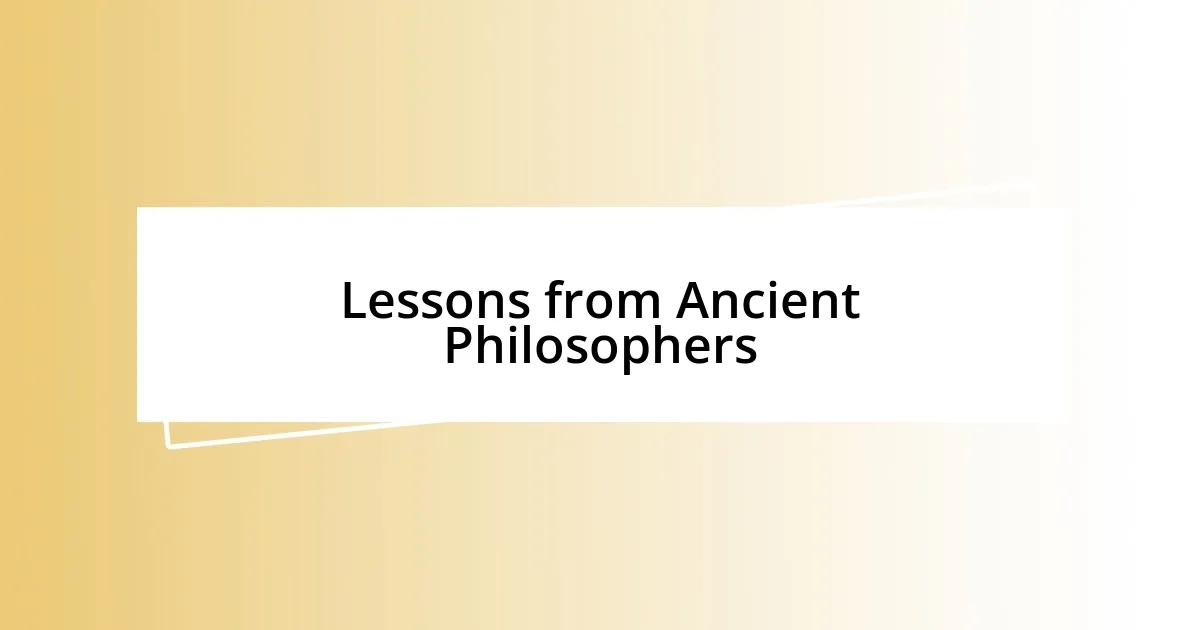
Lessons from Ancient Philosophers
The teachings of ancient philosophers often resonate with profound insights that can guide our modern lives. I distinctly recall a time when I faced a challenging project at work, feeling overwhelmed by deadlines. Remembering Socrates’ idea that “an unexamined life is not worth living,” I paused to assess my priorities holistically. That reflection opened my eyes to where I could simplify tasks and manage my time better, transforming a stressful situation into an opportunity for efficiency. Isn’t it incredible how ancient wisdom can help us navigate contemporary challenges?
In delving into the lessons passed down through ages, I appreciate how figures like Aristotle emphasized the concept of virtue as a means to achieve happiness. When I was uncertain about pursuing a particular career path, I reflected on my values and what truly brought me joy. It was a modest realization: aligning my choices with my personal virtues led me not just to success, but to fulfillment. Here are a few key takeaways inspired by ancient philosophers that I hold dear:
- The Value of Critical Thinking: Engaging with ideas and questioning norms can lead us to richer insights.
- Balance and Moderation: As Aristotle taught, finding a middle ground in our desires can lead to a more satisfying life.
- Self-Knowledge is Key: Understanding ourselves, akin to Socrates’ teachings, empowers us to make informed choices.
Reflecting on these lessons can inspire each of us to seek wisdom in our daily lives.
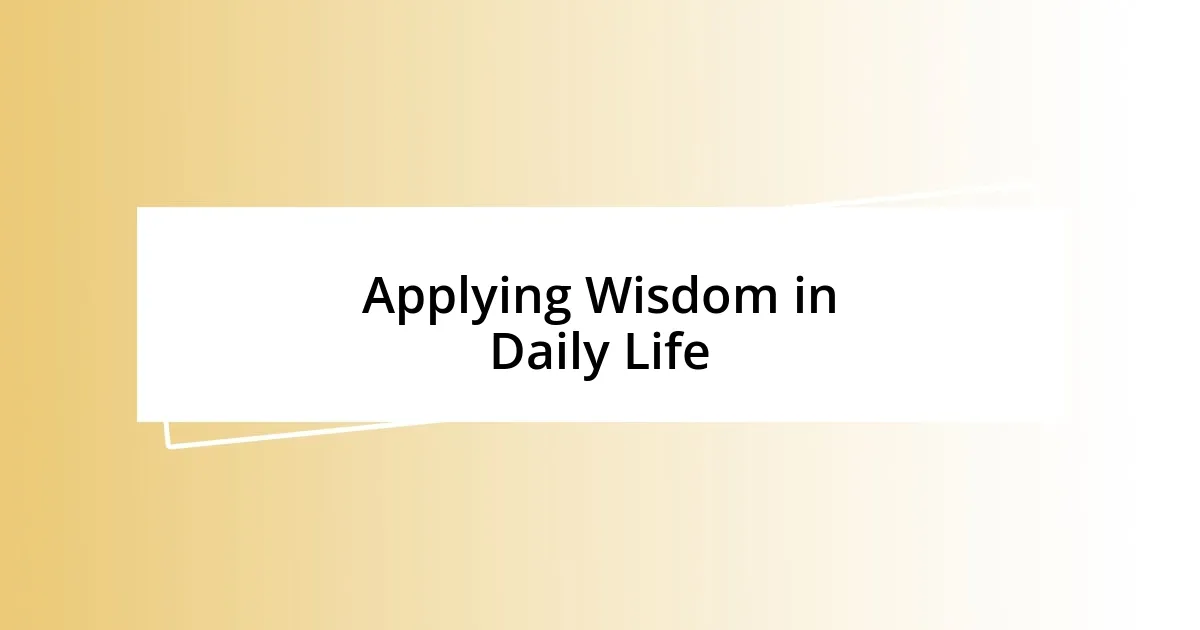
Applying Wisdom in Daily Life
Applying wisdom in daily life often involves making conscious choices that align with our values. I remember a moment last year when I felt torn between a tempting social invitation and my commitment to personal wellness. After reflecting, I chose to honor my need for rest, and that decision not only replenished my energy but also reinforced my dedication to self-care. Have you ever found wisdom in choosing what serves you best over what seems appealing?
In the midst of daily challenges, I’ve learned that wisdom isn’t just theoretical; it’s practical and actionable. I recall a day at work where a colleague confronted me with unexpected criticism. Instead of reacting defensively, I paused—reflecting on the feedback and my response. This shift in approach deepened my understanding of collaboration and improved our working relationship. How often do we let our initial reactions overshadow potential growth?
Moreover, applying wisdom can mean embracing vulnerability. I shared a personal story during a team meeting, which invited others to open up about their own experiences. That simple act of sharing strengthened our connection as a team. It taught me that wisdom lies in the courage to be human with one another. What moments have you had that revealed the strength in vulnerability?
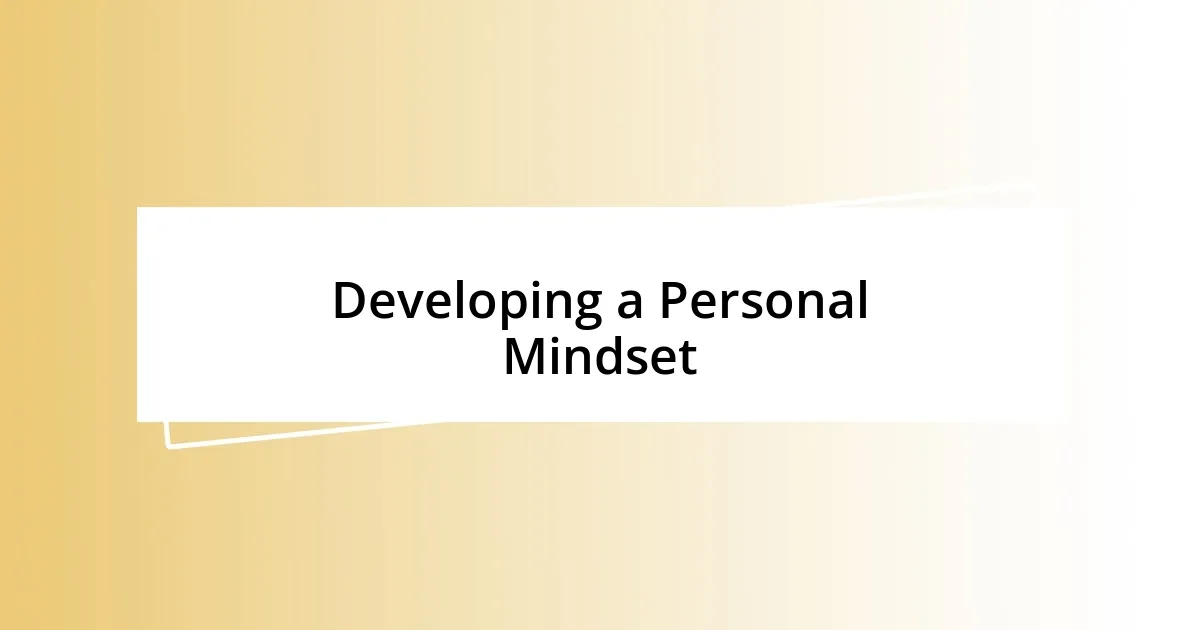
Developing a Personal Mindset
Developing a personal mindset is a journey that requires introspection and growth. I vividly remember a time when I hit a wall while pursuing my goals, feeling lost and directionless. It was during a quiet afternoon, sipping coffee and reflecting on my motivations, that I realized I needed to redefine what success meant for me—not just in terms of achievements, but in alignment with my own values. This awareness sparked a profound change in how I approached challenges.
I find that cultivating a positive mindset often hinges on our daily choices. A while back, I faced a setback after an important project fell through. At first, disappointment threatened to cloud my outlook. However, I chose to reframe the experience as a learning opportunity. I asked myself, “What can I learn from this?” This question transformed my thinking, allowing me to carve a pathway toward resilience and adaptability, crucial traits that have since served me well.
Sometimes it’s the smallest shifts in mindset that yield the greatest impact. Have you ever noticed how your perspective changes when you practice gratitude? I started a daily gratitude journal, jotting down three things I appreciated each day. This simple act helped me focus on the positive, shaping my day-to-day experiences into something richer and more rewarding. Isn’t it fascinating how a deliberate change in mindset can enhance our overall well-being?
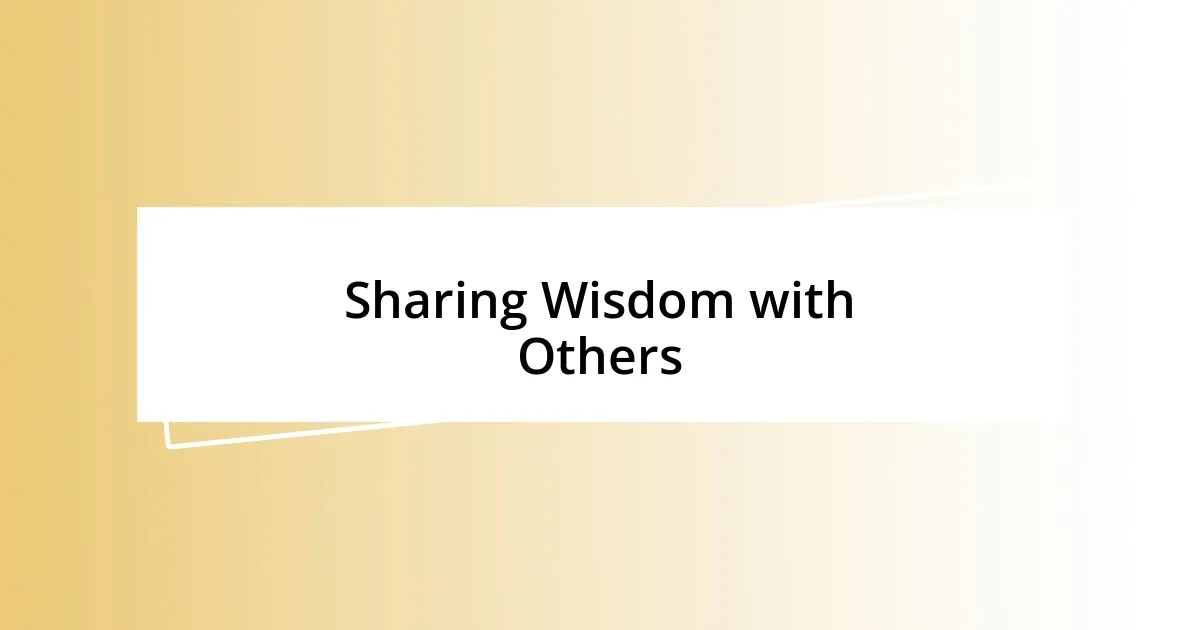
Sharing Wisdom with Others
When I think about sharing wisdom, I often reflect on the beauty of storytelling. Last month, I gathered with friends around a fire, and as we reminisced, I shared a lesson from my earlier career mistakes. The vulnerability I felt was quickly replaced by an overwhelming sense of connection. Have you noticed how sharing our stories can open doors to understanding and empathy?
There’s a unique power in offering guidance based on our experiences. One time, I mentored a young intern who seemed unsure about her direction. I recounted my own uncertainties from that stage in my life and how I navigated through them. As I watched her eyes brighten with recognition, it struck me—an honest exchange of wisdom can inspire hope and encourage someone to explore their own path. Isn’t it amazing how a few words shared can spark a shift in someone else’s journey?
I believe that wisdom should flow like a river—constantly shared and transformed. For instance, during a community workshop, I facilitated a discussion on overcoming failures. Participants opened up, creating a space filled with raw honesty. It reinforced my belief that wisdom flourishes in collective spaces where we lift each other up. How do you think sharing your life lessons can create ripples of change in your community?
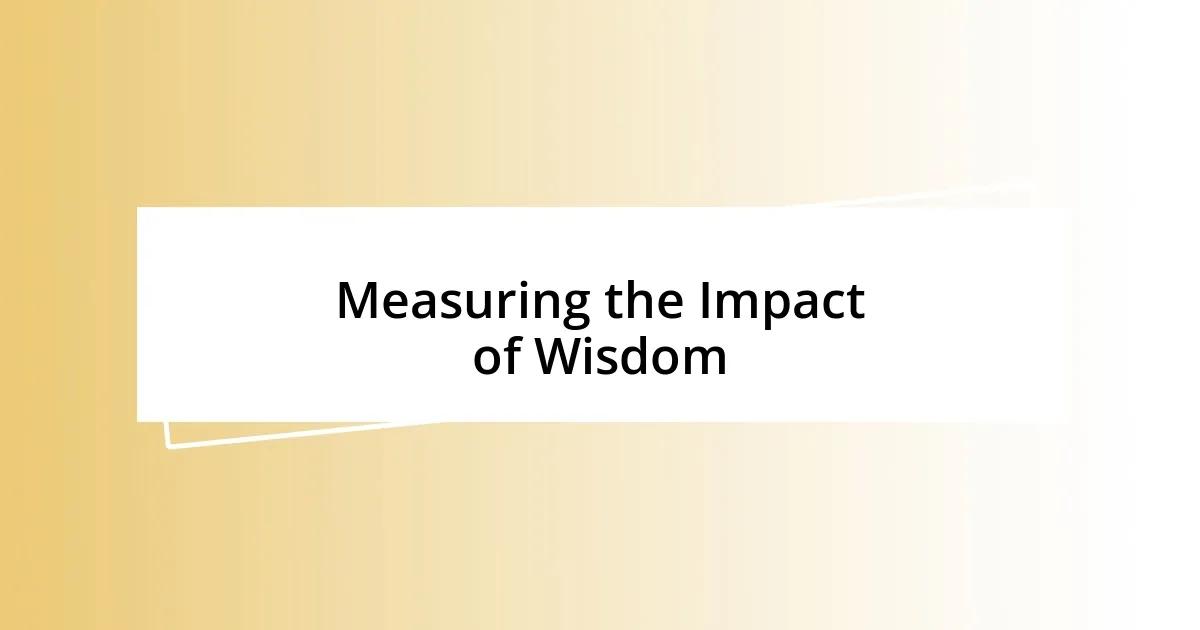
Measuring the Impact of Wisdom
Measuring the impact of wisdom is akin to tracing the ripples from a stone thrown into a pond. I recall a conversation I had with my grandmother about the lessons she learned during the Great Depression. Her stories didn’t just impart survival strategies; they highlighted resilience in the face of adversity. I often wonder, how do we quantify the strength of such lessons in our lives?
There’s something remarkable about observing the transformations triggered by wisdom. I once led a workshop where attendees shared personal stories of hardship and growth, and I could almost feel the room shift in energy. Each story acted as a catalyst, encouraging others to reflect on their journey. Can we genuinely measure the enlightenment gained through shared experiences? I believe those moments of connection can redefine an individual’s path, even if we can’t put a number on it.
Furthermore, I think about the long-lasting effects that wisdom has on our relationships. I recently experienced a conflict with a dear friend, and instead of letting anger cloud my judgment, I chose to communicate openly. The resolution not only deepened our bond but also taught me the value of empathy in conflict. Isn’t that a profound testament to how wisdom shapes our interactions—not just in the moment, but lingering on as we carry those lessons forward?

